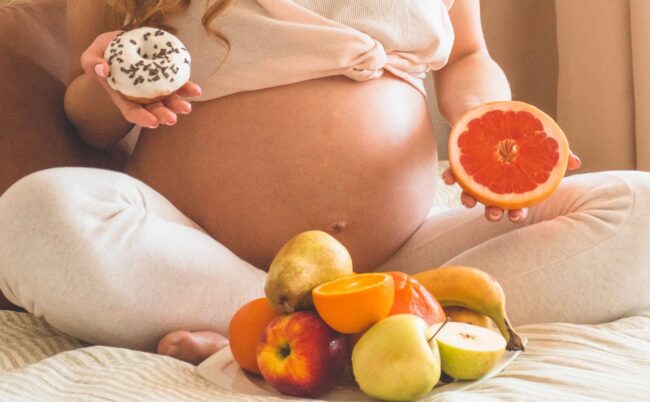After 9 partially restrictive months, women who have just given birth to their baby are tempted to celebrate their newfound freedom by making up for lost time. However, be wary of sirens sugar, fat and stimulants. Beyond the weight gain that should not be encouraged, it is above all in terms of health that this new round is being played out. Let's step into the ringpostpartum diet to see clearly what is good or not to consume during this transitional period.
Desires VS physiological needs
1️⃣ Don’t give in too quickly to temptation
Bringing your old and new eating habits into line is the whole challenge of postpartum. The end of the pregnancy marathon has left you with of exhaustiont, a little being to watch over and, incidentally, a bundle of food frustrations.
However, be careful not to want to compensate for the long months spent without a drop of wine, or shrimp, or raw milk cheese, by having a series of dinner aperitifs. The goal is not to immediately plunge back into one's previous reflexes, without asking questions, but rather to move towards what is right for you.

2️⃣ Rest above all to regain strength after childbirth
It will be emphasized, in this regard, thatgood nutrition goes hand in hand with rest, especially in the first postpartum weeks following the birth of your baby.
Do not hesitate, for example, to put your spouse and/or your other children to contribute preparing simple meals or snacks.

3️⃣ Take care!
Take the time to recharge the batteries And do not carry heavy loads (like a cozy or shopping) immediately after your delivery. This increases the risks of perineal complications going, in some cases, to prolapse; that's to say organ descent.
By sparing yourself, you will also have more time to think about how you will be able to compose your daily menus, by combining taste pleasure and good intake.
A varied diet to take care of your health as a postpartum mother
Every day of your new life as a mother will be an opportunity to do good to your body, providing him with what he needs to recover from both the pregnancy and of childbirth.
4️⃣ Favor foods that are sources of nutrients and proteins
Thus, we will first focus on the sources of tone represented by nutrients and proteins. Ideally, these will be both of animal and plant origin, so as to benefit from the contributions of both families.

However, vegans who give up the first category can prevent deficiencies supplementing by consuming cereals such as rice, barley, but also legumes (red beans, chickpeas, lentils), or by choosing from starchy foods (bread, semolina, potatoes, etc.).
5️⃣ Pay attention to your intake of vitamins, calcium, iron, etc.
If we have a omnivorous diet, eggs, ideally soft-boiled, are interesting. Fish too, because they are full of benefits. As long as they are not too loaded with heavy metals, and this is why it is better to choose species small in size, such as sardines and mackerel (source of Omega 3 fatty acids) or eat white fish.
In addition calcium and iodine they contain, fish and seafood contain essential micronutrients And vitamins D, A and B. That's for the sea side, let's move on to the land side.

Without banning red meat, of which iron intake is welcome, do not neglect white meats. Turkey thus has the advantage of being particularly lean, since it only contains 1% to 4% fat, depending on the piece on our plate.
In the meat register, however, we put the end of charcuterie, which should not appear on the menu of your famous dinner aperitifs!
6️⃣ Avoid foods that are too salty or too sweet
Let us specify that, in general, not only during the postpartum period, that a diet too fatty or too sweet will put your digestive organs to work.
Joking at the moment for your taste buds, this comfort food will not give you the long-term dose of energy you need to get through your day and stay in shape until the evening.

So many helping hands for help you gain energy. Energy amply necessary for your life as a mother. Moreover if you are breastfeeding.
Focus on the diet of breastfeeding women
When we are breastfeeding, we often have as many questions running through our heads as during pregnancy:
- Can I eat what I want before feeding?
- Does everything I ingest reach my infant via the breast milk ?
- What should you avoid?

7️⃣ Foods to avoid while breastfeeding
Tea/coffee 🍵☕
Beyond these questions, we must first of all twist the situation the received idea coffee and tea. No, a breastfeeding woman should not forbid herself from these drinks. She can even consume them during pregnancy, at a rate of two to three cups per day.
Nature being well designed, the baby gets used to it precisely during his stay in your uterus. No reason, then, for him to be disturbed by the presence of theine and caffeine in its milk.
Citrus fruits 🍋🍊
The same goes for citrus fruits, which we read too often should be avoided. Of course, drink orange juice in the evening can disrupt sleep, however this is the only “contraindication”, and this does not only apply to postpartum women but to everyone.
Alcohol 🍺🍷
Same case for alcohol, except that he was totally prohibited during pregnancy. Now that you are postpartum, you can drink it, waiting 1 hour before breastfeeding, or before express your milk with a view to preserving it.
Concerning alcoholic drinks containing bubbles, we will extend this period to 1h30, or even 2h, as they have the effect of producing a faster blood alcohol peak.
I am looking for a practical and discreet breast pump
The fish 🐟🍣
During breastfeeding, no more restrictions on raw fish! Sushi is yours! Indeed, eating fish while breastfeeding may be beneficial because it is a rich source of fatty acids and proteins.
However, it is again important to choose fish to low mercury content to avoid any negative impact on the infant. Finally, only consume fatty foods in limited quantities.
8️⃣ Foods that promote milk flow
It should also be noted that dietary tips can promote milk flow, thanks to the action of certain oilseeds, vegetables and cereals.

By eating almonds and cashews – or their derivatives in the form of vegetable drinks – you have chances to increase your production of breast milk.
Drunk as a herbal tea or decoction, fennel has the same virtues and the same goes for barley malt, which acts on the prolactin hormone by promoting its secretion.
A good diet during breastfeeding and postpartum is therefore essential for keep yourself in shape And promote your milk production !
No hunting for pounds too early
Keep in mind that there is more than just your body shape who has changed, your pace of life too. Some people imagine maternity leave as a relaxing break, but those who experience this situation with dark circles under their eyes know that this is not the case.
9️⃣ Return to physical activity gently
Between accumulated fatigue and sleep broken up by nighttime feedings, you may feel too drained to exercise. That’s good, it is advisable to do less during the first 6 weeks postpartum.
Or even 2 to 3 months in case of scar to be treated ; regarding women who have had a Caesarean and those who have had a episiotomy or major tears during childbirth.
And above all sports practice, we will think carefully about taking care of abdominal and perineal rehabilitation.
🔟 Be lenient with your weight gain
It's counterproductive to step on your scale with guilt. The path to a slimmer figure does not happen in the snap of a finger, it is built step by step, in particular by adapting your lifestyle and diet over the long term.

This rule also applies equally well postpartum that for a diet that we undertake at another period of his life.
Indeed, by wanting to burn fat too much by skipping steps we almost systematically end up with greater weight gain upon arrival.
⏸️ Adopt healthy and balanced eating habits
Take the time to consider this issue of weight loss by adapting your eating habits. With a balanced meal and reasonable portions, most of the work is done.
We must then remember that fruits and vegetables should be daily. On the other hand, hydration will help you better manage cravings and superfoods offer you a natural detox solution, like fermented drinks such as kombucha or kefir.

Ideas from which we can draw inspiration to adoptGood postpartum eating habits. Enjoy your food !






